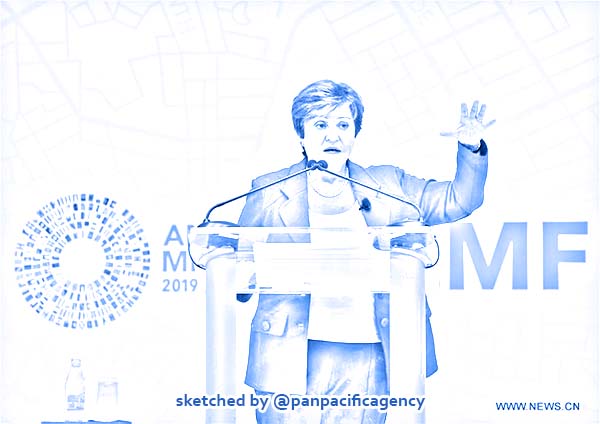IMF again cuts 2020 China growth forecast as Covid-19 shakes the global economy

Kristalina Georgieva, the new chief of the International Monetary Fund (IMF) delivers a speech in Washington D.C., the United States, on Oct. 8, 2019. Trade disputes are taking a toll on global economy, substantially weakening manufacturing activity and investment and holding back economic potential, Kristalina Georgieva said on Tuesday. (Xinhua/Liu Jie). Sketched by the Pan Pacific Agency.
BEIJING, Mar 5, 2020, SCMP. The International Monetary Fund (IMF) has slashed its 2020 growth outlook for China to below 5.6 per cent because of the “sheer geographic spread” of the coronavirus epidemic globally, IMF managing director Kristalina Georgieva said on Wednesday, South China Morning Post reported.
Last month, the IMF forecast the outbreak could lower China’s economic growth this year to 5.6 per cent – 0.4 percentage points below the organisation’s January estimate.
The forecast early this year was based on two assumptions – that the crisis would stay limited to China and that it would remain fully contained. But those conditions have failed to materialise, as community transmission of the disease has occurred in several countries.
“We are already looking at adverse scenarios … in which the impact on growth for China is more significant,” Georgieva told a joint press conference of the IMF and the World Bank. “The Chinese authorities themselves are recognising that there would be a lower growth this year.”
“Again, we will have to work on the numbers, but it is very unfortunate that I have to say that that baseline scenario, no longer holds,” the managing director said.
The Caixin purchasing managers’ index (PMI) fell to 26.5 in February from 51.8 in January, following the massive deterioration in both the official and private manufacturing sectors amid the outbreak in China.
Chinese authorities have briefed the IMF that capacity in Chinese factories has reached 60 per cent as Beijing encourages manufacturers to gradually resume production. Capacity is expected to rise to 90 per cent in the next few weeks, according to the authorities.
The coronavirus epidemic also poses a serious threat to global growth this year, which will be “deep below last year’s levels”, Georgieva said.
“What we are wrestling with is uncertainty, and that defines our projections … but how far it will fall and how long the impact would last is still difficult to predict,” she said. “It will depend on the epidemic and the timeliness and effectiveness of our actions.”
Based on similar, previous crises, “about one third of the economic losses from the disease will be direct costs from loss of life, workplace closures and quarantines”, Georgieva said. “The remaining two thirds will be indirect, reflecting a retrenchment in consumer and business behaviour and, I think, in financial markets.”
IMF has overall lending capacity of US$1 trillion which it can make available to low income countries and emerging middle income countries. It also has the ability to provide up to US$50 billion in immediate emergency financing to eligible countries, according to Georgieva.
Covid-19 has sickened over 94,000 people worldwide and killed more than 3,200, mainly in China.
On Tuesday, the World Bank announced it would provide US$12 billion to help countries respond to the coronavirus threat, including US$6 million from its lending arm, the International Bank for Reconstruction and Development for poor countries, and another US$6 billion from the International Finance Corporation (IFC).
“The $6 million [from IFC] is critical, because it’s private sector financing and it is fast acting, and it takes the form of trade finance and working capital finance,” said World Bank group president David Malpass.
Malpass said the amount of frozen capital in the world has increased substantially, and the World Bank is trying to unlock it so that it may be turned into working capital. Companies need that capital to import goods to rebuild their inventories, which is “critical during a crisis”, according to Malpass.